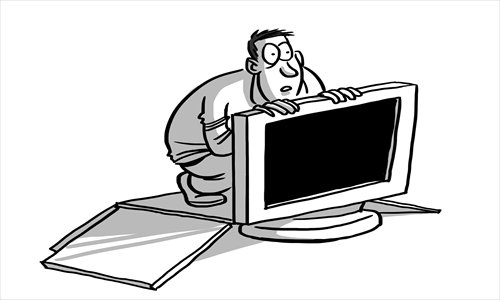Anonymity essential for speaking truth to power

The Beijing municipal government announced Friday that, within the next three months, Chinese Weibo (microblogging) services would require real-name identification.
Over the past two years, Weibo has increasingly become a way for ordinary people, celebrities and officials to express their views. Individuals use Weibo to share simple daily chores or engage in public affairs, while the authorities regard it as a new way of soliciting public opinion.
It's fair to say that Weibo has changed many aspects of the society. But Weibo has also seen many rumors and outright lies. Probably due to this anti-social behavior, the authorities have issued a real-name policy for Weibo, which they believe may restrain people from immoral, even illegal activities, and promote the healthy and well-organized development of the Weibo environment.
Unfortunately, the real-name system is not the best choice for the public opinion environment in China. It not only affects people looking to slander others or spread rumors on Weibo, but also limits all microblog users.
Given our public opinion environment, anonymity is a form of freedom of speech. There have been several examples of people being accused of vague "offenses against social order," because of opinions stated on the Internet.
On November 23, for instance, Wang Peng, a librarian in Gansu Province, was arrested by the police from Wuzhong, Ningxia Hui Autonomous Region after he stated in an online post that a classmate, both of whose parents were local officials, cheated in the national civil service examinations.
The majority of Weibo users are not clear how "offenses against public order" are defined. It seems to be the fallback accusation from local authorities, used to catch citizens who are exposing truths that some officials are trying to hide from the public. Libel and slander cases are understandable, but to resort to criminal charges before the truth of the claim is even tested is an abuse of the law.
If the real-name system is enforced, the majority of the public is likely to keep silent due to the fear of being charged for what they said, especially if exposing the wrongdoing of the powerful. It will harm the positive role Weibo is playing in changing society. Weibo has already exposed numerous scandals. For instance, netizens' highlighting of Guo Meimei's claims to be an affiliate of the Red Cross Society of China sparked outrage across the country and helped promote improvements in the charity sector.
The future of Weibo depends on the voluntary use of the public who sees Weibo as a freer and more real platform than traditional media. This explains both the explosive growth of Weibo and the easy spread of rumors.
The traditional media should think about why the public places more credibility in microblog posts, even if they are just a few words or pictures, instead of the reports from officials on social affairs.
The law already has sufficient regulations and power to tackle those who break the law on Weibo. "Human flesh searches" among netizens, where individuals suspected of breaking the law or performing anti-social actions are traced by thousands of other users, also serve as another way for the whole community to trace and punish offenders.
The key to ending rumors is not to block access to information, but to provide more space for information to compete. I believe the public has the intelligence and wisdom to seek truth from facts and to ignore fabricated news.
If the real-name system is applied to the Weibo users of Beijing-based firms like Sina and Sohu, I guess the Tencent will be the happiest party involved, because it is registered in Shenzhen and won't be restricted by the new rules for now.
The author is a lawyer in Beijing. opinion@globaltimes.com.cn
counterpoint: Netizens' fears of new 'real-name' system misplaced